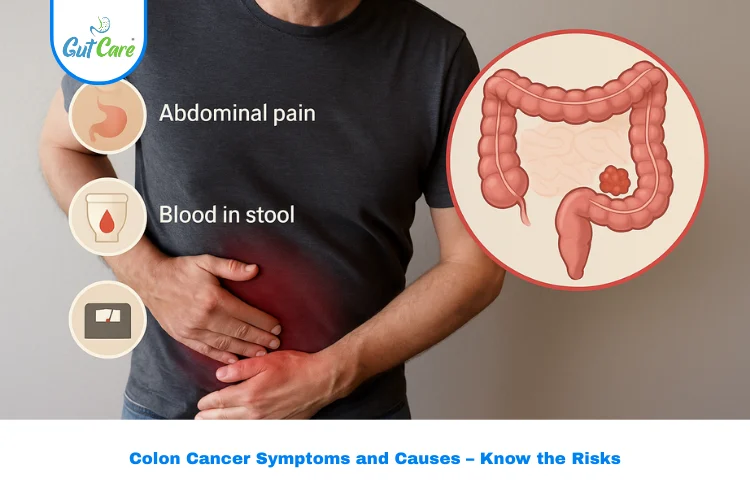Colon cancer can be highly fatal globally, but the early detection of it can be a game-changer in the treatment success. Knowing about colon cancer stages is critical for the right health-decision making. At Gutcare Clinics in Bangalore, we put the spotlight on early screening, the right diagnosis, and personalized care for all our patients.
We have prepared this guide to go over the different stages of colon cancer – Stage 0 to Stage 4 – with a description of each, signs you could observe, and the usual treatment methods.
Why Understanding Colon Cancer Stages Matters
Knowing the stage of colon cancer helps doctors determine:
- How far the cancer has spread
- The most effective treatment options
- The likely outcome or prognosis
The colon cancer staging system most often used is the TNM system (Tumor, Nodes, Metastasis), but for simplicity, stages are grouped into Stage 0, Stage 1, Stage 2, Stage 3, and Stage 4.
Stage 0 – Carcinoma in Situ
What it means:
- Cancer cells are found only in the innermost lining of the colon.
- It has not spread to deeper layers or outside the colon.
Treatment:
- Usually removed with a polyp during a colonoscopy.
- Surgery is rarely needed beyond this.
Prognosis:
- Nearly 100% survival rate if detected and treated early.
Precautions:
- Follow-up colonoscopies are essential to ensure no new abnormal cells develop.
Stage 1 – Early Invasion
What it means:
- Cancer has grown into the inner layers of the colon wall but hasn’t reached lymph nodes or other organs.
Treatment:
- Surgery to remove the affected portion of the colon (colectomy) may be required.
Prognosis:
- Excellent survival rates with timely treatment.
Precautions:
- Maintain a healthy diet rich in fiber, avoid smoking, and limit alcohol.
Stage 2 – Local Spread
What it means:
- Cancer has grown through the wall of the colon but hasn’t reached lymph nodes.
- Divided into Stage 2A, 2B, and 2C depending on depth and nearby organ involvement.
Treatment:
- Surgery remains the primary treatment.
- Some patients may also need chemotherapy, especially if high-risk features are present.
Prognosis:
- Very good if detected early, but risk of recurrence increases.
Precautions:
- Regular follow-ups and imaging tests are crucial.
Stage 3 – Lymph Node Involvement
What it means:
- Cancer has spread to nearby lymph nodes but not to distant organs.
Treatment:
- Surgery plus chemotherapy (adjuvant chemotherapy) to kill any remaining cancer cells.
Prognosis:
- Good survival rates with aggressive treatment.
Precautions:
- Watch for side effects of chemotherapy and maintain strong immune health.
Stage 4 – Metastatic Colon Cancer
What it means:
- Cancer has spread to distant organs such as the liver, lungs, or bones.
Treatment:
- Combination of surgery, chemotherapy, targeted therapy, and sometimes radiation.
- Treatment focuses on controlling the disease and improving quality of life.
Prognosis:
- Survival depends on the extent of spread and response to treatment. Some patients live many years with advanced treatments.
Precautions:
- Strong emotional and palliative support is vital alongside medical care.
Key Takeaways for All Stages
- Stage 0–1: Early detection means minimal treatment and high cure rates.
- Stage 2–3: Aggressive treatment needed; close monitoring for recurrence.
- Stage 4: Focus on disease control, extending life, and symptom relief.
When to See a Doctor
Seek medical advice immediately if you experience:
- Persistent changes in bowel habits
- Blood in stool
- Unexplained weight loss
- Abdominal pain or discomfort
Summary
For the most part, individuals with a family history of the disease are recommended to undergo screening before age 45. Early screening can save lives.
We at Gutcare Clinics, Bangalore provide colonoscopy screening, expert diagnosis as well as complete and personalized cancer care that fits your requirements.
FAQs – Colon Cancer Stages
1. What are the different colon cancer stages?
The colon cancer stages are from Stage 0 (malignant cells only found in the colon lining) to Stage 4 (cancer has spread to several other organs). The stage indicates what kind of treatment and the prognosis that are most suitable.
2. How serious is Stage 3 colon cancer?
Stage 3 implies that the disease is still limited to the local lymph nodes but no distant organs have been invaded. Most of the patients obtain long-term survival with surgery and chemotherapy.
3. Can Stage 1 colon cancer be cured?
Of course. Surgery alone is generally sufficient for the treatment of Stage 1 colon cancer, and chemotherapy is not required by most patients after that.
4. Does Gutcare Clinics in Bangalore treat advanced colon cancer stages?
Absolutely. To cover all colon cancer stages, Gutcare Clinics, in addition to chemotherapy and targeted therapy, also provides supportive care for Stage 4 patients.
5. How fast does colon cancer progress from one stage to another?
The speed of growth is different for various types of cancer. Some types of cancer wait for several years to grow slowly, whereas aggressive types can advance rapidly. The best way is to do regular screening so that early detection is possible.




